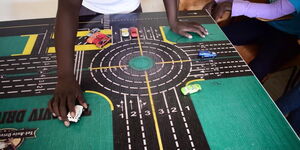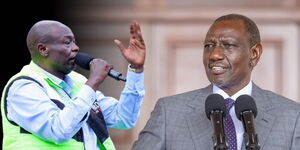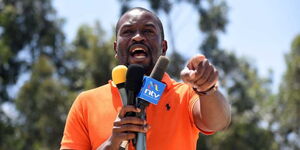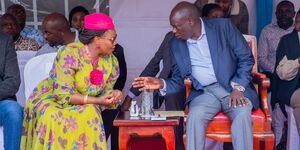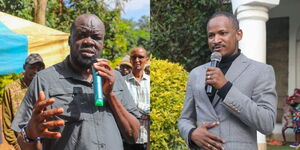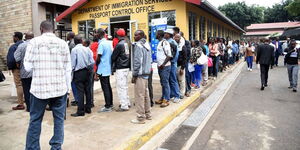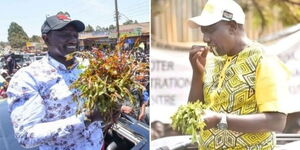The Supreme Court judges delivered judgement on the nine pertinent issues raised by Presidential contender Raila Odinga and his running mate Martha Karua.
Part of the issues raised by the petitioner centered around the split between Independent Electoral and Boundaries Commission (IEBC) Chairperson Wafula Chebukati camp (supported by two commissioners Abdi Guliye and Marjan Hussein) and that of Vice Chairperson Juliana Cherera who sided with three other commissioners including Justus Nyang’aya, Francis Wanderi and Irene Masit.
In the ruling, Chief Justice Martha Koome noted that Chebukati did not have super powers to tally and verify the results excluding the four commissioners.
The seven-judge-bench however stated that the four commissioners actively participated in the tallying and verification of the results.
Below is the video:
{"preview_thumbnail":"/files/styles/video_embed_wysiwyg_preview/public/video_thumbnails/MdrnDPT92jc.jpg?itok=QQiX_uWv","video_url":"","settings":{"responsive":1,"width":"854","height":"480","autoplay":0},"settings_summary":["Embedded Video (Responsive)."]}
"We find that pursuant to Article 138 (3C), the power to verify and tally vest not in the Chairperson but in the Commission. The latter carries exercise through the secretariat staff and other persons hired.
We find that the chairperson cannot allocate to himself the power to verify and tally the results of a presidential election to the exclusion of other members of the Constitution... Although the power to declare the results after verification and tallying is vested in the chairperson, he does so only as a delegate of the commission.
"We, however, take cognizant of the fact that the four commissioners actively participated in the verification and tallying exercise from the beginning until just before the declaration of the results by the chairperson. They took turns announcing the results as verified and current and were present and active during the actual verification and tallying at Bomas.
"The events of August 15, therefore, came as a surprise. As Kenyans waited for IEBC Chairperson to declare results, sporadic violence broke out at Bomas. The violence was contained by the security forces but there was unexpected drama as two different factions of the commission began to emerge," she stated
Koome, in the ruling, further cast doubt on Chebukati's handling of the IEBC leadership noting that it needed far-reaching reforms.
"We note that apart from their 11th hour denunciation of the verification and tallying process and the averment regarding the contact of the chairperson, the four commissioners have not placed before this court any documents showing that the election was either compromised or the result would have substantially differed from that of the chairperson. Critically, they have not explained why they participated in a verification process when they knew it was opaque up until the last minute.
"The Chairperson, on his part, did not make matters any better by maintaining a stoic silence even as things appeared to be falling apart. All these, in our view, points to a serious malice in the governance of an institution entrusted with a monumental task of midwifing our democracy, an institution which needs far-reaching reforms of which we shall say more in our detailed reasons," she noted.
She further maintained that the wrangles between the leadership at IEBC did not affect the verification process of the result.
"But are we to nullify an election on the basis of a last-minute boardroom rapture, the details of which remain scanty and contradictory between the chairperson and some of his members?... In the absence of any evidence of violation of the Constitution and our electoral laws, how can we accept an election in which the people participated without hindrance as they made their political choices.
"The current dysfunctionality at the Commission impugns the state of its corporate governance but does not affect the conduct of the 2022 election... We are satisfied that notwithstanding the division apparent between the chairperson and the four commissioners, IEBC carried out the verification carrying a declaration of results in accordance with Article 138 3(C) and 10 of the Constitution," Koome added.
The four breakaway commissioners accused Chebukati of operating in isolation before declaring Deputy President William Ruto as the President-elect on August 15.
In their affidavits, Cherera and Nyang'aya argued that the IEBC chair often released results late into the night disguising them as coming from the Commission.
"A few minutes to midnight and without informing or consulting the Commission, the chairperson issued a press statement dated July 21, 2022, accusing the Directorate of Criminal Investigations (DCI) of harassment of personnel and confiscation of items to be used by the Commission for the 9th August 2022.
"The chairperson did not consult the Commission before issuing the statement and/or engaging in a public spat with security agencies, ostensibly on behalf of the Commission," she swore in her affidavit.
In their response, Chebukati and Guliye claimed that Cherera, on numerous occassions, attempted to sway the Commission's chair to moderate the results in favour of a run-off.
Guliye's affidavit argued that Cherera asked the commissioners to deduct votes from Ruto's tallies and add them to the rejected votes to have the country head to a run-off.
"CEO Marjan (Hussein Marjan) walked into the boardroom with the final results and handed over a copy of the results to each Commissioner. A debate ensued. Four Commissioners Cherera and Commissioners Justus Nyang'aya, Irene Masit and Francis Wanderi protested and insisted that the results should be changed in light of the NSAC delegation's communication.
"Cherera suggested that the margin is not too big and could be manipulated by moving 233,211 votes from Hon. Ruto to the rejected ballots category. When my turn to speak came I told the Commissioners that I would not be a party to a scheme to sabotage the will of the people," Guliye stated in his affidavit.
Judges Philomena Mwilu and Isaac Lenaola later cast doubt of Chebukati's haste to announce the winner a day before the 7-day window period was set to elapse.
In a straight-pointed question during the Presidential petition hearing on Thursday, September 1, Lenaola poked holes in the Chairperson's failure to use the extra day to iron out issues with the other four commissioners.
The Supreme Court judge further raised concerns about the decision to announce the winner a day earlier without releasing results from 27 contentious constituencies.
"I know that the events of August 15 are in our minds but remember that there was an extra day where Mr Chebukati could have declared the result.
"Why did you not wait until that day, reach out to the commissioners - now named the four - try to reach a consensus to address the questions on the 27 Constituencies so that this suspicion would not have been an issue? Is there any other reason why you did not take an advantage of the extra day to do what you have to do?" He questioned.
During the contested period, Chebukati declared Deputy President William Ruto as President-elect having defeated the petitioner, Raila Odinga, after garnering the constitutionally requisite threshold of 50 per cent plus one vote.

